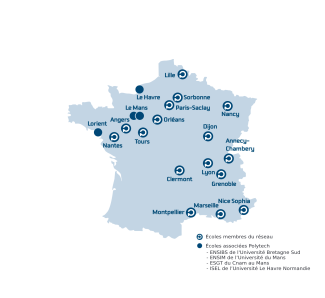
Polytech Marseille, the engineering school of Aix-Marseille University, is located in one of France's leading higher education and research clusters. A public school, it is a member of the Polytech school network and offers a complete engineering curriculum (post-bac or bac + 2). It is one of the largest schools in the Polytech network, with some 1,600 students in the engineering and preparatory cycles combined. A professional school, Polytech Marseille offers engineering courses accredited by the Commission des Titres d'Ingénieurs (CTI), covering all major scientific fields. Polytech Marseille joined the Conférence des Grandes Ecoles in 2016.
1533
Engineering students
380
Preparatory students
8400
Graduate engineers
3
Geographical locations
41 000 m2
of premises
A professional school with 9 engineering specialties
Polytech Marseille offers a preparatory cycle and an engineering cycle in specialties accredited by the Commission des Titres d'Ingénieurs (CTI), covering all major scientific fields.
These specialties incorporate the latest technological advances and are constantly evolving, driven by science and the world of research to which they are closely linked.
They are also professionally oriented, with the constant aim of training engineers to meet the needs of companies and the job market.
Polytech Marseille relies on a sizeable network of graduates working in companies (more than 8400 alumni by 2022).
More recently, Polytech Marseille has set up two specialized Master's programs, accredited by the Conférence des Grandes Ecoles. These are aimed at students with 4/5 years of higher education, and can complement engineering studies in the fields of circular organizations and sports engineering:
A grande école at the heart of a major university
Polytech Marseille's parent university, Aix-Marseille Université, is one of France's leading centers of higher education, with 70,000 students, 3,700 teaching and research staff and 2,900 non-teaching staff. All disciplines are represented: health, science and technology, arts, literature, languages, humanities, law and political science, economics and management. It has 10 teaching and research sites, and 5 major campuses.
It boasts 150 accredited laboratories with world-renowned teams.
Created from the merger of three universities in the Aix-Marseille area, Aix-Marseille Université enjoys national and international visibility and is recognized for the excellence of its teaching and research.
The engineering schools behind the courses now grouped under the Polytech Marseille label: IUSPIM, Institut Universitaire des Sciences Pour l'Ingénieur de Marseille (founded in 1985), IUSTI, Institut Universitaire des Systèmes Thermiques Industriels (founded in 1986), ICF, Institut Charles Fabry (founded in 1993), ESIL, Ecole Supérieure d'ingénieurs de Luminy (founded in 1993).
Polytech Marseille presentation

With its selective recruitment methods, its small numbers of top-notch students, its focus on professionalization, and its strong school culture relayed by students and graduates alike, Polytech is the ideal environment for students with a passion for high technology. International students account for more than 17% of the school's enrolment, and international exposure is widely encouraged by mobility abroad to partner universities or during internships. The school also benefits from a privileged ecosystem in a region labeled FrenchTech, where the sectors of information and communication technologies, healthcare, energy, microelectronics, aeronautics and services are very dynamic. Many links with local companies can thus be developed to innovate. Come and join us!
Romain Laffont, Director of Polytech Marseille
Today, the Polytech network comprises 15 university engineering schools and 5 associate schools; their diplomas are accredited by the Commission des Titres d'Ingénieur.
Within the framework of their respective universities, the schools in the Polytech network have developed an original model for training engineers "à la française". Today, the Polytech model is recognized by companies, by students who identify the Polytech brand in the university landscape, and by local and national authorities who cite the network as an example of successful networked engineering training. Polytech schools are organized in line with international standards, with engineering "faculties" within university complexes, and backed by top-notch research laboratories. They have also demonstrated their ability to work together successfully on large-scale initiatives, such as:
- The Geipi Polytech competition, the 1st post-baccalaureate competition in terms of the number of candidates;
- The PeiP (Parcours des écoles d'ingénieurs Polytech), a joint preparatory cycle for over ten years;
- The AVOSTTI program (as part of the IDEFI), which has opened the door to new audiences:
- Reorientation at bac+1 for PACES students, in partnership with health UFRs;
- A specific PeiP for STI2D baccalaureate holders, in partnership with IUTs.

The Polytech network comprises 15 schools in France:
- Angers
- Annecy-Chambéry
- Clermont-Ferrand
- Grenoble
- Lille
- Lyon
- Marseille
- Montpellier
- Nancy
- Nantes
- Nice-Sophia
- Orléans
- Paris-Sud
- Paris-Sorbonne
- Tours
The 15 schools of the Polytech network
Angers, Annecy-Chambéry, Clermont-Ferrand, Grenoble, Lille, Lyon, Marseille, Montpellier, Nancy, Nantes, Nice-Sophia, Orléans, Paris-Sud, Paris-Sorbonne, Tours
Polytech network figures
- 15 public engineering schools
- 5 associate schools
- 3 types of training: students, apprentices, employees
- 17,000 engineering students
- 80,000 engineering graduates
- 1,200 doctoral students
- 160 associated research laboratories
- 2,000 internships or study stays abroad per year
- +100 specialties
The 12 major scientific fields covered by the network
- Water, environment and landscaping
- Electronics and digital systems
- Energy and process engineering
- Biological and food engineering
- Biomedical engineering, instrumentation
- Civil engineering
- Industrial engineering
- Computer science
- Materials
- Applied mathematics and modeling
- Mechanics
- Electrical Systems
Pathways to excellence at university
All Polytech engineering programs are accredited by the Commission des Titres d'Ingénieur (CTI), which guarantees the quality of French engineering training. They belong to leading universities, are supported by top-level research and are geared towards professionalization, as well as being open to international markets.
Once they have completed their two years of higher education, students in the preparatory cycle of the Polytech schools can enter one of the 15 schools in the network.
Mobility between schools is also possible in the engineering cycle, to facilitate the construction of personalized career paths.
